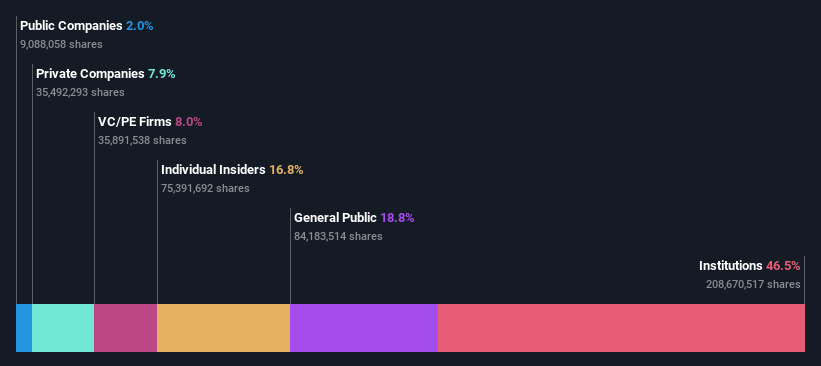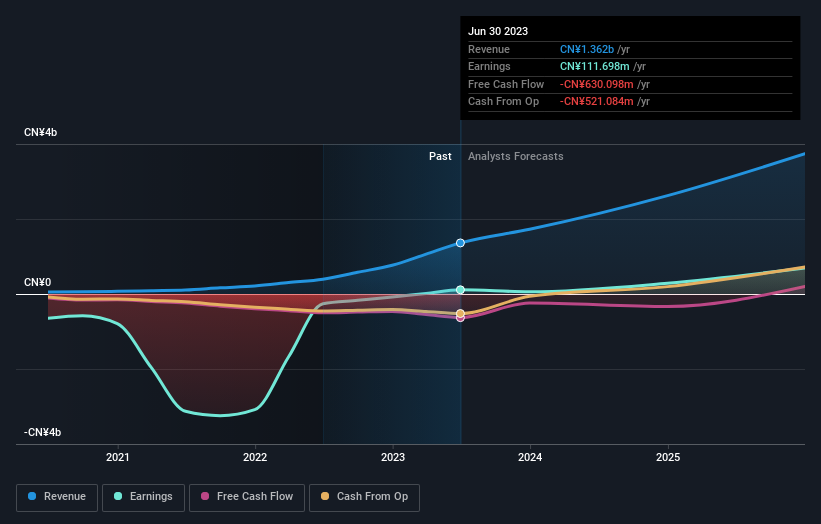- Hong Kong
- /
- Healthcare Services
- /
- SEHK:6606
Institutional owners may ignore New Horizon Health Limited's (HKG:6606) recent HK$471m market cap decline as longer-term profits stay in the green

Key Insights
- Significantly high institutional ownership implies New Horizon Health's stock price is sensitive to their trading actions
- 51% of the business is held by the top 9 shareholders
- 17% of New Horizon Health is held by insiders
If you want to know who really controls New Horizon Health Limited (HKG:6606), then you'll have to look at the makeup of its share registry. And the group that holds the biggest piece of the pie are institutions with 47% ownership. In other words, the group stands to gain the most (or lose the most) from their investment into the company.
Institutional investors was the group most impacted after the company's market cap fell to HK$11b last week. However, the 21% one-year return to shareholders might have softened the blow. They should, however, be mindful of further losses in the future.
Let's take a closer look to see what the different types of shareholders can tell us about New Horizon Health.
See our latest analysis for New Horizon Health

What Does The Institutional Ownership Tell Us About New Horizon Health?
Many institutions measure their performance against an index that approximates the local market. So they usually pay more attention to companies that are included in major indices.
As you can see, institutional investors have a fair amount of stake in New Horizon Health. This suggests some credibility amongst professional investors. But we can't rely on that fact alone since institutions make bad investments sometimes, just like everyone does. It is not uncommon to see a big share price drop if two large institutional investors try to sell out of a stock at the same time. So it is worth checking the past earnings trajectory of New Horizon Health, (below). Of course, keep in mind that there are other factors to consider, too.

Hedge funds don't have many shares in New Horizon Health. Our data suggests that Yiyou Chen, who is also the company's Chief Scientific Officer, holds the most number of shares at 8.1%. When an insider holds a sizeable amount of a company's stock, investors consider it as a positive sign because it suggests that insiders are willing to have their wealth tied up in the future of the company. With 8.0% and 7.2% of the shares outstanding respectively, Qiming Weichuang Venture Capital Management (Shanghai) Company Limited and Invesco Ltd. are the second and third largest shareholders. Additionally, the company's CEO Yeqing Zhu directly holds 3.4% of the total shares outstanding.
We did some more digging and found that 9 of the top shareholders account for roughly 51% of the register, implying that along with larger shareholders, there are a few smaller shareholders, thereby balancing out each others interests somewhat.
While it makes sense to study institutional ownership data for a company, it also makes sense to study analyst sentiments to know which way the wind is blowing. There are a reasonable number of analysts covering the stock, so it might be useful to find out their aggregate view on the future.
Insider Ownership Of New Horizon Health
While the precise definition of an insider can be subjective, almost everyone considers board members to be insiders. Company management run the business, but the CEO will answer to the board, even if he or she is a member of it.
Insider ownership is positive when it signals leadership are thinking like the true owners of the company. However, high insider ownership can also give immense power to a small group within the company. This can be negative in some circumstances.
It seems insiders own a significant proportion of New Horizon Health Limited. It is very interesting to see that insiders have a meaningful HK$1.8b stake in this HK$11b business. Most would say this shows a good degree of alignment with shareholders, especially in a company of this size. You can click here to see if those insiders have been buying or selling.
General Public Ownership
The general public-- including retail investors -- own 19% stake in the company, and hence can't easily be ignored. This size of ownership, while considerable, may not be enough to change company policy if the decision is not in sync with other large shareholders.
Private Equity Ownership
With a stake of 8.0%, private equity firms could influence the New Horizon Health board. Some investors might be encouraged by this, since private equity are sometimes able to encourage strategies that help the market see the value in the company. Alternatively, those holders might be exiting the investment after taking it public.
Private Company Ownership
We can see that Private Companies own 7.9%, of the shares on issue. It's hard to draw any conclusions from this fact alone, so its worth looking into who owns those private companies. Sometimes insiders or other related parties have an interest in shares in a public company through a separate private company.
Next Steps:
I find it very interesting to look at who exactly owns a company. But to truly gain insight, we need to consider other information, too. Case in point: We've spotted 2 warning signs for New Horizon Health you should be aware of, and 1 of them is potentially serious.
If you are like me, you may want to think about whether this company will grow or shrink. Luckily, you can check this free report showing analyst forecasts for its future.
NB: Figures in this article are calculated using data from the last twelve months, which refer to the 12-month period ending on the last date of the month the financial statement is dated. This may not be consistent with full year annual report figures.
If you're looking to trade New Horizon Health, open an account with the lowest-cost platform trusted by professionals, Interactive Brokers.
With clients in over 200 countries and territories, and access to 160 markets, IBKR lets you trade stocks, options, futures, forex, bonds and funds from a single integrated account.
Enjoy no hidden fees, no account minimums, and FX conversion rates as low as 0.03%, far better than what most brokers offer.
Sponsored ContentValuation is complex, but we're here to simplify it.
Discover if New Horizon Health might be undervalued or overvalued with our detailed analysis, featuring fair value estimates, potential risks, dividends, insider trades, and its financial condition.
Access Free AnalysisHave feedback on this article? Concerned about the content? Get in touch with us directly. Alternatively, email editorial-team (at) simplywallst.com.
This article by Simply Wall St is general in nature. We provide commentary based on historical data and analyst forecasts only using an unbiased methodology and our articles are not intended to be financial advice. It does not constitute a recommendation to buy or sell any stock, and does not take account of your objectives, or your financial situation. We aim to bring you long-term focused analysis driven by fundamental data. Note that our analysis may not factor in the latest price-sensitive company announcements or qualitative material. Simply Wall St has no position in any stocks mentioned.
About SEHK:6606
New Horizon Health
An investment holding company, engages in the research and development of screening products for colorectal, cervical, and other types of cancer in the People’s Republic of China.
High growth potential and fair value.
Market Insights
Community Narratives



